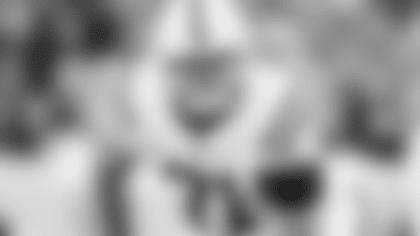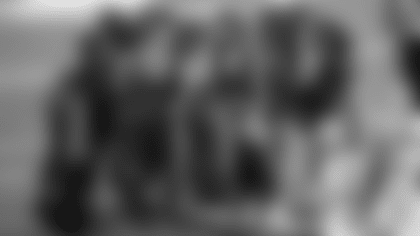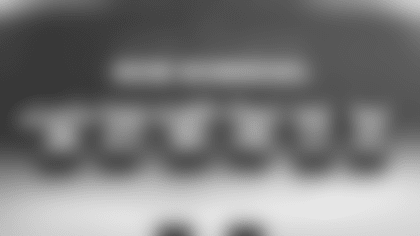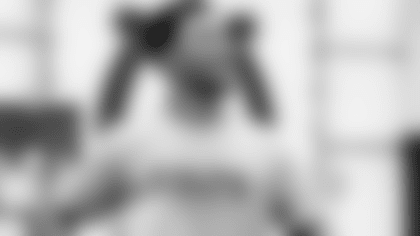How much of coaching is coaching the sport and how much of it is teaching young men?
"It's a health mix of the two things. With a young guy, you're teaching him how to be a pro. With guys like Winston Justice, Mike McGlynn and Samson Satele here, you're pretty much just teaching them the offense. You're giving them tidbits, but they know the bulk of it because they've been around. A younger guy like Anthony Castonzo or someone you just draft is still learning. You have to do a little bit of both. Guys in this league, you just give general 'men' advice – stay out of bars, call a friend if you need a driver, be careful in your personal life. You give just general life advice. If a guy comes to you with a problem, you help him. If you can't, find somebody who can."
What is the geographic area where you have lived or worked that you like the most?
"Right now, I'm liking Indy. I really like the area. Before here, I'd probably say Chicago when I was working for the Bears. In downtown Chicago, there are a ton of things to do. I know there are a ton of things to do here, too, I just haven't gotten to it yet. Once my family gets here, I'm sure they're going to want to go out and see certain things – the Children's Museum, things like that. We are fortunate to have the Pacers. In Pittsburgh, we didn't have pro basketball. We had baseball, though. I liked the Taste of Chicago. There were a lot of great restaurants and things to do for adults. There was the Aquarium and museums for families. There were plenty of things to do on the weekends. The size of the city was exciting. I regret that my wife, Monica, was not able to get down there as much because the kids were little. There were good restaurants like Tavern on the Rush and Gibson's. There was great theaters, but we missed out on some of those things."
Who is the person most responsible for you to make it to professional football and/or the NFL?
"I have to give that credit to (Chicago Head Coach) Lovie Smith. He gave me a phone call in 2004 when I was at the University of Akron. I was on a recruiting trip and was flying into Detroit. It was a Friday and when I landed, I had four or five different messages. One was from the coach I currently worked for, J.D. Brookhart. One was from Mike DeBord, who I worked for at Central Michigan. There was one more, and there was one from Lovie Smith. He is the guy I credit for letting me into this league. I talked to him that Friday afternoon. I went to interview on Monday. I took the job that afternoon and was back a week later full-time. It happened fast. It would have happened sooner, but I made a promise to Coach Brookhart that I would finish recruiting. It was near the end of January and signing day is the first Wednesday in February. I finished out the work because I had a couple of recruits on the line, and it was important to finish the job I was in so no parties were hurt. As soon as I closed the deals and finished my work, I was on a one-way flight to Chicago. The rest is history."
What is your greatest football moment prior to the NFL and in the NFL?
"Football-wise, I would say winning a national championship at Michigan in 1997, or probably getting married. As far as the NFL, being a part of three Super Bowl teams (Chicago, Super Bowl XLI; Pittsburgh, Super Bowls XLIII and XLV) and winning one. You feel bad because you lost two of them. As people know who have lost a Super Bowl, you have to go to the party afterwards. It (stunk). It's no fun. I've done it twice. Other than that, there are general things you remember. Graduating college is a great moment that is special. College is a long haul, hour and hours of classes, summer school. Staying on schedule to graduate takes a commitment, and it is a huge accomplishment."
Was the Ohio State-Michigan rivalry as big to those on the inside of it, given the attention it gets?
"It is. It is a hatred you can't describe. I remember as a player riding into Columbus on the team bus and you see little old ladies on the sidewalk giving you the finger, or mooning you. It was bad. It's really nasty, but I think there's a respect there because both programs are great. At the end of the day, Michigan is better."
What is it like when players from those schools are drafted by the same team and then share a locker room?
"It's easy, until the last game of the season. When you get to the last week, there are wagers going on, or tee-shirts have to be worn if you lose, or haircuts have to happen. There are things like that. Things are easy until that game week. When I was in Pittsburgh, Coach (Dick) LeBeau and I would have a wager because he's an Ohio State guy. Santonio Holmes, when he was there, I lost things to him a couple of times. That's when it gets interesting. Each guy has a passion for his team. They always think their team is better than ours. That situation between the schools always is going to be there."
What is it about football that drives you the most?
"Being at the top of your profession, the Super Bowl, is a motivation. Being able to teach is rewarding. The thrill of game day drives me to do this. You may hear a guy here say, 'rebuild.' Why do we have to rebuild? I've been on a team with a rookie quarterback that went 11-5 and made the playoffs as a number two seed (Chicago, Kyle Orton, 2005). I don't think there is a need to talk about rebuilding. Right now, that's what is driving me. I want to prove everybody wrong. All I heard around draft time was that Andrew Luck was going to get beat up his rookie season. Why is he going to get beat up? We're going to have a decent offensive line. He's going to be a great quarterback. He's going to get rid of the ball if there is nothing to throw it to. I don't see why he would get beat up. That's what is driving me – to protect him and make sure he has success as a rookie and prove the naysayers wrong. Let's win some games."
Do you like the relationships along the way, or do you remember the accomplishments?
"Sometimes you have accomplishments, sometimes you don't. Relationships last forever. If you get a bond with a guy, you have that forever. I may not get public recognition for the next few years, and I never really look for it. I want my players to trust me and believe in me as a coach. That is the most important thing. That is the recognition I want. Relationships out-weigh accomplishments at least 10-to-one, maybe more. It's not even close how much more meaningful relationships are than accomplishments."
Do you have any rituals or superstitions?
"The only thing I really do on game day is I like get to the stadium on the second set of buses, and I like to walk. I walk about half an hour around the field. I put my headsets on and just walk. Eventually, I go into the locker room, come down a little bit and get in game mode. That is all I do. I don't have any special socks or underwear or anything like that. It's more solitary thinking, burning energy. It's not superstition. Some people have to sit in the same seat or eat the same thing week-to-week. I don't have anything like that. I never did."
If you weren't coaching, what would you do?
"My dream job would be something simple, like working for Nike, or something like that. I would work for Reebok, or some type of apparel company. I've always been around sports, always loved Nike shoes or shorts. That is what I would want to do."
Who is the most memorable player you have coached?
"I would say all players. You have special moments with all of them. As far as the funniest or who you looked out for, Olin Kreutz in Chicago. He's retired now. From a total athlete standpoint, a guy like Maurkice Pouncey, who is in Pittsburgh. He always has high energy. He's athletic, an all-around good player. Those are two of the guys you remember."
Why is it that offensive linemen are some of the most interesting guys to talk to?
"Playing on the offensive line is like being in a secret society. You feel it's like, 'Us Against the World.' We make everything in our meeting room fun. We close our door and we're in our own little world. At the end of the day, we don't want the spotlight on us. We want to do our job, get in the shower, get in the car and go home. Sometimes things can get weird. For the most part, we try to stay even-keeled and low key. If the unit does not function successfully, everyone is going to know it. I've told the guys here, we are the foundation. If we don't protect, the quarterback can't throw the ball. If we don't run block, no one can run. If you don't do either of those things, we're not going to score points. I know a lot of people say defense wins championships. It's true to a certain degree. If the offensive line doesn't do its job, we can't do anything. The defense can't average 15-to-20 points a game. For us to average in the high 20s a game, we have to produce on the offensive line. For any quarterback to have success, he has to be protected and feel comfortable in the pocket."
Do offensive linemen form the tightest bonds of any position group on a team?
"Yes. In my eight years in the league, I would say every Thursday night during the season, the offensive line would go out and have dinner – rent a party bus or something and go downtown. They'd hang out with no wives, kids or coaches and just socialize and create a bond that will be everlasting. No matter if you play five or 10 years and leave, the bond stays, and that is one of the most beautiful things. Guys know they have to be able to hang out with each other, talk to each other and play in unison on a line with each other. The tighter the bond, the better the line is. You have to be tight to have any kind of success. If you have one guy doing his own thing, the line is not going to work. There has to be a human element involved. Linemen are not just interchangeable parts. The line is unique because five guys have to be on the same page. On defense, one guy can to the wrong way and make a heck of a play. One of the greatest plays in Super Bowl history was by James Harrison and his 100-yard interception return against Arizona. It was a mental error. He was supposed to be rushing the quarterback, but he dropped into coverage. Everybody remembers the play for what he did but from a coaching standpoint, 'It was a great play, but you did the wrong thing.' All five offensive linemen have to be on the same page and in conjunction with the tight end to have a play."
What was your feeling when you won your Super Bowl?
"It was a great feeling because I knew what it felt like to lose one. Just to go through the struggle and the lulls of a season and finish on top, winning despite of injuries and guys going down and others stepping up, to win it all was amazing. I had lost to the Colts with the Bears. The game against Arizona was closer than what I thought it should have been, but to be under the gun and have to score on the last drive of the game was a beautiful thing. It was a long walk from the press box to the field when it was over. Once you have gone to the Super Bowl, you feel like a veteran after that. You're not overly excited about everything. You just want to get it over with, a been-there, done-that type of deal. The only thing you're hunting is the win. You don't really care about anything else – hats, tee-shirts – you just want the ring. When I lost the first time, I thought I might never get back. The year before we played, the Super Bowl was in Detroit (2005 season). My wife is from Michigan and she said, 'We should go to the Super Bowl because we may never go.' We went and sat in the stands like every other fan and watched the game. The next year (2006), we were in it (Colts-Chicago). The year after, we took the year off, then we were back in it in Pittsburgh (2008 against Arizona). Then my brother (with New Orleans) was in it and we made it again with Pittsburgh in 2010 (against Green Bay). Three years in a row my mom went to the Super Bowl. If my brother (now with San Francisco) didn't lose to the Giants last year in the NFC Championship game, the family would be been back in for the fourth year in a row. If they don't lose, my mom is there again."
Your career likely has kept you from traditional holiday celebrations. Do you have one that stands out in particular?
"It's just part of the deal. You know what you're getting into. I was fortunate enough that I was dating my wife when I got into coaching, so she understood what could possibly happen as far as missed holidays and things like that. One thing I can say is I haven't enjoyed a Thanksgiving at home in South Carolina since I started coaching in the NFL, so we're talking nine years ago. There have been times when I've eaten Thanksgiving dinner alone in my house when my wife and kids went to her home. I've gone over to other coach's houses sometimes when my family is away. To say I've gone home to my family for Thanksgiving, it's been about nine years."














